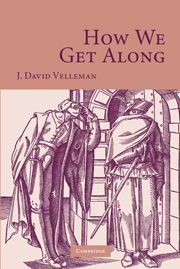4 - Reflecting
Published online by Cambridge University Press: 05 July 2015
Summary
I arrived at my conception of agency by squeezing the duplicity, or doubleness, out of an imagined improvisational actor. To begin with, I imagined away the distinction between the player and the character he plays, by imagining that he plays his actual self. Then I imagined away the distinction between the player and his audience, by imagining that his performance is addressed, in the first instance, to himself. I noted that the actor playing to himself can accommodate his audience by doing what it is already prepared to understand; that the audience can rely on the actor to be thus accommodating; but that they need to acknowledge their collaboration, since pretending to work independently will still involve duplicity.
In thinking of rational agency as the result of overcoming doubleness, I am following a venerable tradition. Many philosophers have observed that properly functioning agency requires inner fractures to be healed. Plato thought that rational agency requires unification in the form of cooperation between divisions of the soul. Harry Frankfurt thinks it requires identification with parts of oneself – which, after all, is the overcoming of a division between an identifying self and a self identified with. In my view, an agent properly unified is more like an improvisational actor who is ingenuously and knowingly portraying himself, for himself.
- Type
- Chapter
- Information
- How We Get Along , pp. 89 - 114Publisher: Cambridge University PressPrint publication year: 2009

